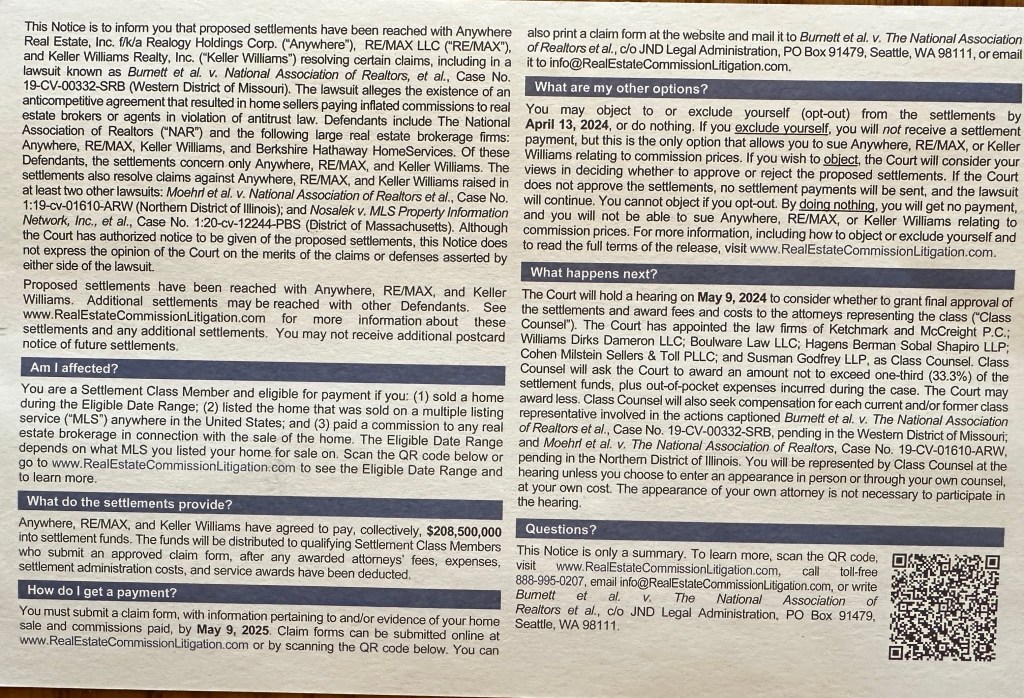It was mid-February when clients, family and friends began asking Jason Posnick about strange postcards appearing in their mailboxes. Thanks to Lisa Chinatti, the broker-owner at Chinatti Realty Group, he was not completely caught off guard.
“Lisa is super on the pulse. She talks with a lot of people, and she announced to our company that this was coming and went through what exactly we should expect,” said Posnick, the sales manager at Chinatti Realty Group.
The postcards are mailers being sent to lawsuit class members to notify them of the settlement agreements reached between Keller Williams, RE/MAX, Anywhere and the plaintiffs in the Sitzer/Burnett, Moehrl, and Nosalek commission lawsuits.
What do the postcards say?
The mailers are titled “Notice of Proposed Settlements” and they began hitting the mailboxes of home sellers in mid-February. Millions are expected to be sent out across America.
“If you sold a home and paid a commission to a real estate agent, you may be part of class action settlements,” the postcards read.
 The back of the postcard
The back of the postcardIn addition to postcards, emails are also being sent to some class members and press releases have been published online. The class notifications are a routine part class action litigation, which requires the plaintiffs and defendants notify all class members of the suit and any settlements, in which they may be a part of.
JND Legal Administration is in charge of distributing the mailers, emails and press releases. The firm was appointed as the designated settlement administrator for the suit in 2022, over a year prior to any settlement agreements being reached. While it is not uncommon for the parties themselves to handle settlement administration work, legal experts told HousingWire that due to the size and scope of these lawsuits it is not surprising that a third-party administrator was brought in.
The notifications were approved by Judge Stephen Bough, who is overseeing the Sitzer/Burnett suit, on January 11, 2024, and the usage of settlement fund to pay for the distribution of the notifications was approved on Feb. 1.
In addition to informing the recipients of the settlement agreements, the notifications tell recipients that if the settlements are approved, they would be eligible for a payment from the settlement fund if they sold a home during the eligible date rang, listed the home that was sold on an MLS anywhere in the US and paid a commission to any real estate brokerage in connection with the sale of the home. A website link and QR code are included for recipients to check if their home sale falls within the date range for their MLS. The emails and postcards also note that the settlement total is $208.5 million and that funds will be only distributed to “qualifying settlement class members who submit an approved claim form,” which much be submitted by May 9, 2025.
Recipients are also given the option to “opt out” or object to the settlement. If recipients wish to opt out or object they must do so by April 13, 2024. Those who opt out have the option to sue the defendants independently, but they cannot object to the settlement. Those who object to the settlements will have the Court consider their views during the final approval hearing for the settlement agreements which is scheduled for early May 2024, but they will be unable to sue the defendants on their own.
Agents talk value of transparency
For real estate professionals like Posnick, the appearance of these notifications has meant that they have had to field a lot more questions about the lawsuits and agent commissions.
“We’ve signed 47 new listings year to date, and we’ve had plenty of conversations with other sellers that we didn’t sign, but there are a lot more conversations surrounding transparency,” Posnick said. “It is not just conversations about the commission lawsuits, but about commissions, representation, marketing — they want to totally understand what their agents are doing for them and I think that is a good thing for agents and the industry.”
Posnick noted that one client even had the settlement notification postcard on the kitchen table when he and another agent from the firm went to meet with the seller to sign their listing agreement.
“The consumer wanted to know what it meant for them and if they needed to be concerned about anything, so I asked them what they were worried about,” Posnick said. “They then opened right up and said they wanted to make sure they weren’t paying too much. I stressed that commissions are 100% negotiable and asked them to just focus on what they were comfortable compensating our side of the transaction and it led to a really open conversation about what services we would provide them with, and we were able to settle on a commission and sign the listing.”
Jessica Edgerton, the chief legal officer at LeadingRE, also appreciates the conversations that these postcards creating between agents and clients.
“I think this can really be an opportunity for folks to do what we’ve all been advising everybody to do anyway, which is to explain to your clients that you have a personal commitment as a broker or an agent to transparency,” Edgerton said. “You have the chance to educate your client on your value as a broker and show transparency through your actions in openly discussing this.”
When asked about the lawsuits or any information on the postcards, Edgerton is recommending that agents don’t get emotional about these questions, but also don’t brush it off as nothing.
“Certainly don’t tell them that they should or shouldn’t respond to it, but you can emphasize that it is entirely their choice,” Edgerton advised.
She also noted that some agents have had clients tell them that they wouldn’t want to do anything to hurt them or their colleague, in which case agents should emphasize that their decision to join or not join the settlement would have no direct impact on them.
“As of right now, also, you can tell them that the legal process is ongoing, that none of these settlements have been finalized, and that there are ongoing appeals,” Edgerton added. “It is also really important to explain that the settlements aren’t an admission of guilt.”
An opportunity to impress
At Berkshire Hathaway Drysdale Properties, broker-owner Gretchen Pearson is encouraging her agents and brokers to use the notifications as motivation to reach out to past clients and others in their sphere of influence.
“They are calling and will discuss the card if the client brings it up, but they are really using it as a touch point to see how they are doing and if they bring up the card or the lawsuit then they can answer questions and basically tell them that as of right now we still don’t have a final judgement,” Pearson said.
An agent in Illinois who asked to remain anonymous, is taking things a step further, by calling her contacts for the sole purpose of discussing the postcards, the lawsuits and what they mean for seller, buyers and herself as an agent.
“If you don’t discuss this with your clients, how does that make us look to consumers?” she asked. “It is further exasperating the negative stereotype some people have of Realtors. I want them to be aware of what is happening and know to expect something in the mail because I already had a family member throw out their postcard.”
She also noted that by not informing clients or others in your sphere of influence, agents may be preventing people from potentially not joining the settlement because they think it is a scam.
“If they want to be part of the settlement, they should have the opportunity to fill out the paperwork and how will they know what it is if we don’t explain,” she said.
While she knows this approach may not be for everyone, Edgerton likes the directness of this approach.
“I think it is fabulous and it shows them that we are transparent,” Edgerton said. “You show your value by either answering questions they may have or for the folks who haven’t received the postcard yet, and you’ve had that conversation in advance, it kind of softens the blow.”
Associations have been quiet
As agents and brokers have looked to navigate client questions and the distribution of these notifications, one source of guidance has been noticeably silent.
“We got a bit of a heads up since we are with Berkshire Hathaway and they are in the suit, but we’ve gotten nothing from the National Association of Realtors, California Association of Realtors, or Nevada Association of Realtors,” Pearson said.
The agent in Illinois noted that her state association had published some information in their monthly e-newsletter, which was sent out the end of February and Edgerton said she had seen some communications out of Washington Realtors. But overall, not much communication from Realtor groups.
“It is disheartening,” Pearson said. “There has really been a lack of leadership with both just letting us know about the cards, but what this means and what language we can use about it as agents and brokers.”












 English (US) ·
English (US) ·